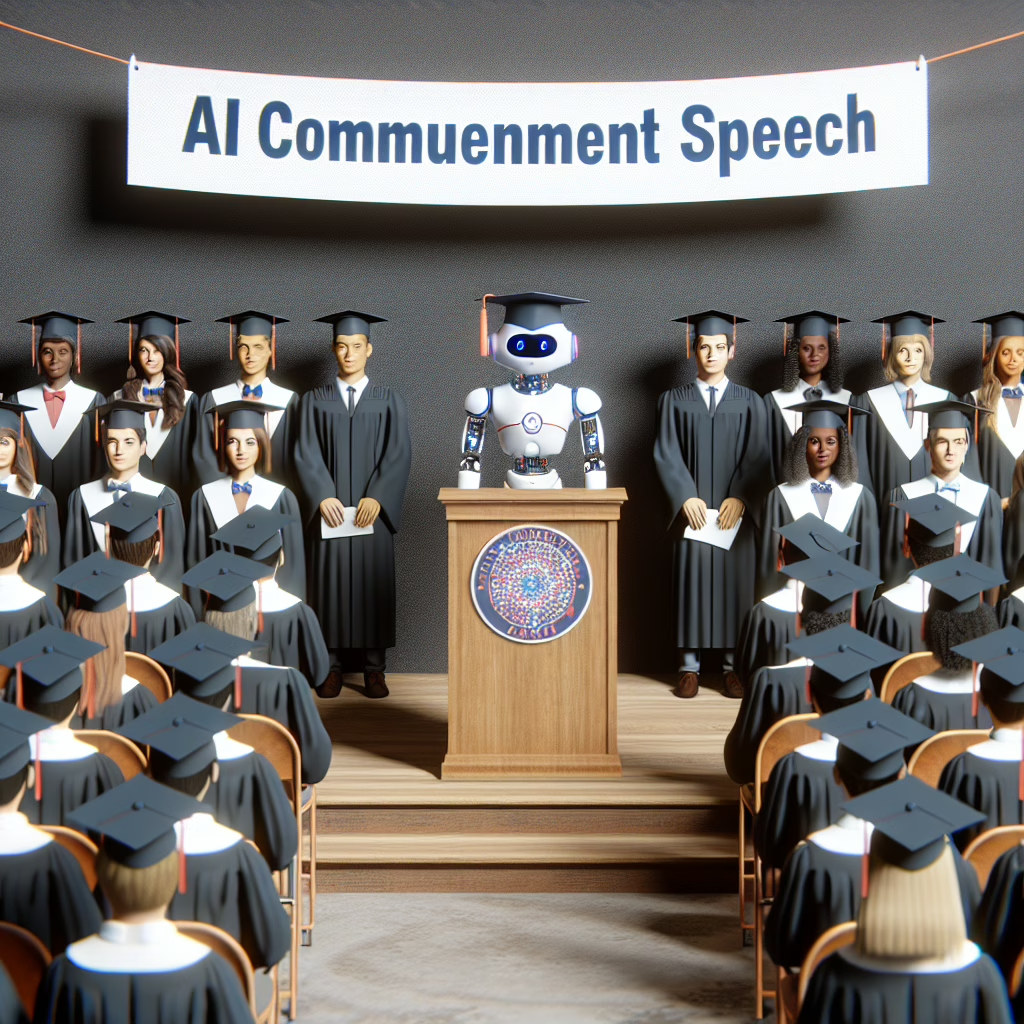Ah, the digital age! A time when artificial intelligence (AI) is not just a buzzword but also your next graduation speaker. Yes, you heard that right! As we leap into the future, AI is making its presence felt in ways that are both amusing and slightly unnerving. With AI commencement speeches becoming a trend, let’s dive into this brave new world where robots might just have something to say about your post-graduate plans.
The Rise of AI in Commencement Speeches
Who would have thought that your graduation ceremony would feature a robot reciting heartfelt platitudes about life, ambition, and the importance of networking? It seems like only yesterday that we were worried about self-driving cars; now we’re preparing to hear an AI deliver a commencement address that could rival any motivational speaker.
Imagine sitting there in your cap and gown, waiting for words of wisdom to wash over you, only to be greeted by a computer-generated voice droning on about algorithms and data sets. But don’t worry! While it may lack human warmth, AI can certainly churn out some impressive statistics—like how many graduates will actually find jobs within six months!
What Can AI Teach Us?
Now, you might be wondering what pearls of wisdom an AI could possibly impart. Surprisingly, it can offer some insights based on vast data analysis. For instance, it could remind you that perseverance is key—after all, it took numerous iterations for developers to create a chatbot that can understand sarcasm. Who better to inspire resilience than a machine that learns from its mistakes?
Furthermore, AI can also provide a unique perspective on the job market. Picture this: your AI speaker might say, “As you enter the workforce, remember that 85% of jobs that will exist in 2030 have yet to be invented. So good luck figuring out what to apply for!” Hilarious yet terrifying—just like college itself!
The Humor in AI’s Delivery
While an AI commencement speech may sound like a scene straight out of a sci-fi movie, let’s not forget the humor woven into its fabric. The robotic tone could lead to unintentional comedic moments. Imagine the awkward pauses as the AI processes “what is motivation?” or misinterprets the concept of “dream big” as “upload dreams to cloud storage.”
And if humor isn’t enough to keep you entertained, there’s always the potential for glitches! One moment your AI might be spouting profound quotes from Shakespeare; the next, it could mistakenly quote lines from your favorite sitcom instead. Just think of it as an unexpected twist in an otherwise predictable ceremony!
The Future: Embracing Technology with Open Arms (and Minds)
As we prepare for more AI involvement in our daily lives—including those crucial moments like graduation—we should embrace this technological evolution with open arms. After all, if robots can deliver commencement speeches, they can certainly help us navigate our futures.
One key takeaway? Adaptability is crucial. Just as we learned to navigate group projects with varying degrees of participation (shoutout to every group member who ghosted), we’ll need to adapt to this new reality where technology plays an ever-increasing role in our lives.
Conclusion: Are You Ready for Your Robotic Graduation?
So here’s a thought: the next time you attend a graduation ceremony featuring an AI speaker, take a moment to appreciate how far we’ve come—and how far we still have to go. It’s not every day you get life advice from an algorithm! And who knows? Maybe someday you’ll find yourself laughing at memories of awkward robot speeches while reminiscing about your own human experiences.
What do you think? Will you cheer for AI at your graduation or prefer a good old-fashioned human touch? Share your thoughts below!
Thank you to Wired for the original article!
Additional Insights on AI and Graduations
AI doesn’t just stop at delivering speeches; it also has the potential to enhance the graduation experience in various ways. By utilizing AI-driven platforms for personalized graduation plans, institutions can improve student engagement and communication.
- Interactive Q&A Sessions: Imagine if graduates could ask questions directly to an AI-powered system during the ceremony. This could address career inquiries and provide tailored advice based on individual aspirations.
- Networking Opportunities: AI systems could analyze guest profiles and recommend connections based on interests. Making valuable connections becomes easier when technology lends a helping hand!
- Feedback Analysis: After the event, AI could process graduate feedback to enhance future ceremonies, ensuring that they are more relatable and engaging.
In a world where technology continually shapes our experiences, the role of AI at commencement speeches illustrates just how far we’ve come and what the future holds for our educational systems. Let’s embrace this digital evolution—and who knows, even graduation might become a source of great laughter and learning with AI leading the charge!

